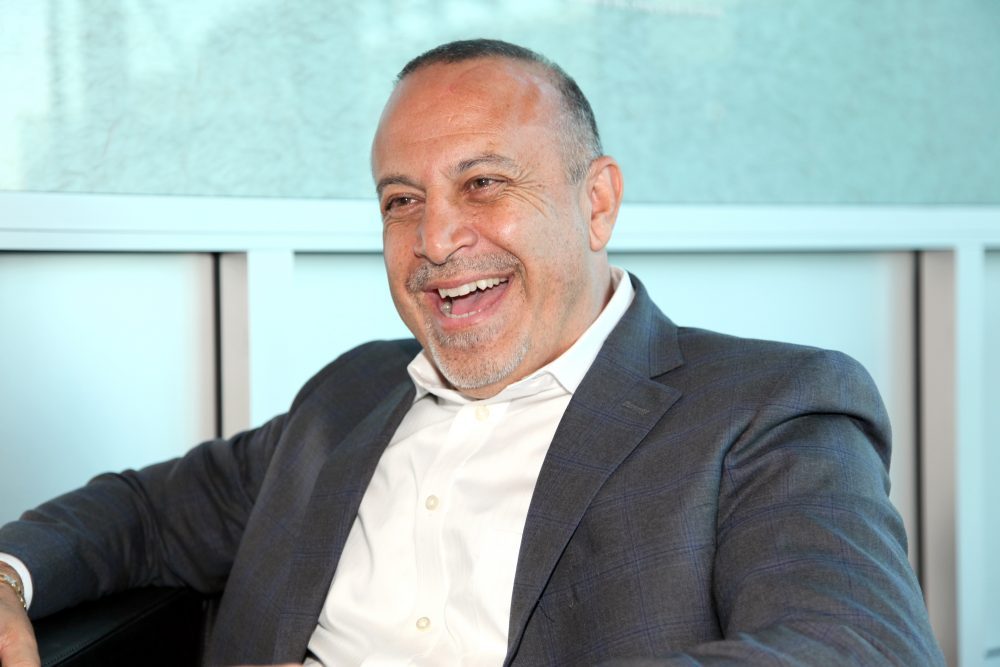
Photo by Aaron Salcido.
Mike Madrid is a political consultant at the Sacramento-based public affairs firm GrassrootsLab. He previously served as the political director for the California Republican Party. Before taking part in a Zócalo panel discussion titled “Is the Republican Party Dead?” at the National Center for the Preservation of Democracy in downtown L.A.’s Little Tokyo district, he sat down to talk about Voltaire, Jesuit priests, and collecting pre-1969 baseball cards.
What’s the strangest job you’ve ever had?
I was the manager of a Domino’s Pizza in Tempe, Arizona, when I was 19 years old. I was one of the youngest managers in the country, and my life plan at 19 was to become a franchisee in Australia. And, as fortune would have it, I ended up getting into a car accident and I couldn’t work and had to go back to school while I was rehabilitating, and it kind of changed what I was going to do with my life.
Was there a teacher or professor who really influenced you?
Most of them were probably in the theology classes I took at Georgetown, which I think re-centered a lot of my thinking on the world and who we are. I was raised Catholic but I didn’t really understand what Catholicism was until I went to Georgetown. I’m a Mexican Catholic, which means we’re not really into the ideology, or theology, or we’re not Bible readers; it was a cultural Catholicism. And I think I really came to a better intellectual understanding and a better spiritual understanding of what my Catholicism meant. I’m not a practicing Catholic; I haven’t been to Mass in a very long time. But it’s a very strong influence in my life, and what I try to spend my time and energies on.
Which person, living or dead, would you most want to have a beer with?
Voltaire. I would like to know what it would be like to be so far ahead of your time and be functional. Somebody who just had a complete command of his time, his age, and his place in the world. There have been great thinkers in different times, but they were too far removed from our present, but Voltaire I think would’ve been able to [sum things up] in 140 characters or less. I would’ve loved to follow Voltaire’s Twitter feed.
What device do you do most of your reading on?
Paper. I’m old school. I haven’t read a newspaper on paper in 14 or 15 years. But I like to read books. I still have a library and I still build my library. And I’m very aware it’s a relic of the past, but it kind of gives me a visual understanding where I can look at the books and recall what I’ve read and experienced. It’s an important visual reminder for me to get back to what I was thinking about when I was reading those books.
What’s your profession in your next life?
Probably a Jesuit priest.
Specifically a Jesuit?
I would like to visit a few of the orders; I’d like to do my freshman rush, check out the frat houses, see what they have to offer! I would like to be focused on the service to others as a daily spiritual practice. But I don’t want to miss the intellectual part of that, too, so I think Jesuit kind of gets me there.
Did you have a childhood hero or someone you emulated?
My heroes were always people that I knew. Like my wrestling coach in high school, who I really kind of idolized. And I had a weird hobby: I collected baseball cards that were pre-1969, which was before I was born. They were the heroes of my father’s generation. They were heroes that he idolized. While I never saw them play, I knew everything about them. I have the 1953 Topps Willie Mays card.
What’s hanging on your living room walls?
Oil paintings of my daughter and myself that I painted. I paint figurative pieces, but the one piece that always brings me the most joy is a painting of my daughter and me, an abstract piece, holding hands, looking out at the ocean in Puerto Vallarta.



